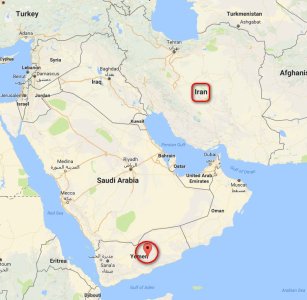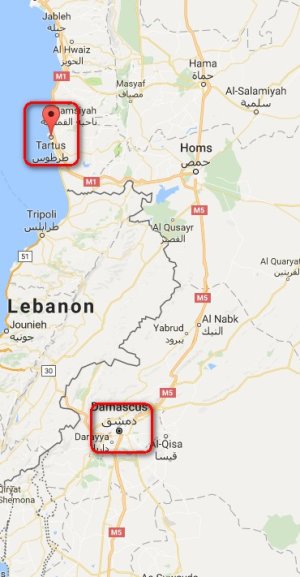Iran is winning the strategic struggle for influence in the Middle East against its rival, Saudi Arabia, according to a study by the London-based International Institute for Strategic Studies (IISS).
Iran's regional rivals have spent billions of dollars on Western weaponry, much of it from the UK.
Yet for a fraction of that cost, sanctions-bound Iran has been able to successfully embed itself across the region into a position of strategic advantage.
It has a major influence - verging on a controlling influence in some cases - over the affairs of Syria, Lebanon, Iraq and Yemen.
'Tipping the balance'
The fact that Iran has stealthily built up a network of non-state alliances right across the Middle East, often referred to as "proxy militias", is nothing new.
Starting with Hezbollah in Lebanon, the Islamic Republic has been seeking to export its revolutionary ideology and expand its influence beyond its borders ever since the return of Ayatollah Ruhollah Khomeini to Tehran in 1979.
But the 217-page report by the IISS, entitled "Iran's Networks of Influence in the Middle East", provides unprecedented detail on the extent and reach of Iran's operations in the region.
"The Islamic Republic of Iran," says the report, "has tipped the balance of effective force in the Middle East in its favour." It has achieved this, argue its authors, "by countering superior conventional forces with influence operations and use of third-party forces".
The key ingredient here has been the Quds Force, the external operations wing of the Islamic Revolution Guard Corps (IRGC).
Both the Quds Force and its leader, Maj Gen Qasem Soleimani, answer directly to Iran's Supreme Leader, Ayatollah Ali Khamanei, bypassing Iran's conventional military structures to become effectively an independent entity.
Since the US-led overthrow of Saddam Hussein's regime in Iraq in 2003, the Quds Force has intensified its operations across the Middle East, providing training, funding and weapons to non-state actors allied to Tehran.
It has also developed unconventional forms of asymmetric warfare - such as swarm tactics, drone and cyber-attacks - that have allowed Iran to offset its enemies' superiority in conventional weapons.
In April, US President Donald Trump designated the IRGC, including the Quds Force, a "foreign terrorist organisation" (FTO). It was the first time the US had named a part of another government as an FTO.
Iran reacted to Mr Trump's decision by designating the US military in the Gulf region as a terrorist entity, a largely symbolic gesture.
Jack Straw, who was the UK's foreign secretary from 2001 to 2006 and who has visited Iran several times, believes that Gen Soleimani's role goes well beyond that of a military commander.
"Qasem Soleimani has basically been running their foreign policy in the region through alliances backed by force," he says.
In response to the IISS report, a spokesman at the Iranian embassy in London told the BBC: "If the report means that Iran's role in its region should be respected, it is a welcome sign.
"The policy of ignoring Iran did not work. Iran resisted. Iran has also successfully controlled damages of US economic terrorism. So yes, it is a powerful nation and has a lot of relations with other nations with a lot of initiatives for regional co-operation."
Hezbollah - 'junior partner'
The Lebanese Shia Islamist movement Hezbollah, which is both a political party and an armed militia, "has achieved unique status among Iran's partners", says the report, which documents in detail Iranian supply routes via Syria and Iraq.
Hezbollah has played an important role in conflicts in both of those countries, fighting alongside Syrian forces loyal to President Bashar al-Assad and assisting Iraqi Shia militias.
Although the report classifies Hezbollah as "more akin to a trusted junior partner and a brother-in-arms for Iran than a proxy", it nevertheless says the group has become a central interlocutor for an array of Arab militias and political parties with ties to Iran.
Embedding into Iraq and Syria
The US-led invasion of Iraq and the subsequent overthrow of Saddam Hussein's regime completely changed the shape of the Middle East and provided Iran with ample opportunity to take advantage.
Prior to that event, the Gulf Arab states saw Sunni Arab-ruled Iraq as something of a bulwark against any Iranian expansionism.
With that bulwark gone, Iran has successfully capitalised on its religious and cultural ties inside Iraq - which has a Shia Arab majority - to become a dominant force in the country.
It has armed and trained a paramilitary force called the Popular Mobilisation Units (PMU), which helped defeat IS but which many Iraqis see as a form of Iranian colonisation.
But Iran has not had it all its own way. The recent mass demonstrations and violence across Iraq show that young people are far from happy with their Iranian-backed government.
The report says "the PMU's transition from a band of patriotic volunteers to an entrenched part of the country's ruling order has cost it popular support".
Jack Straw believes Iran may have taken on more than it can handle in Iraq.
"What's going on in Iraq is very serious for the Iranians as they risk losing control there," he says.
The Syrian government has long been an Iranian ally. In the country's civil war, Iranian forces, Hezbollah and other Shia fighters, along with Russian air power, have been instrumental in helping President Assad survive and turn the tide against the rebels.
Today, says the IISS report, "Iran is embedding itself in the evolving Syrian government and informal security structures... enhancing its threat to Israel".
Disrupting Gulf rivals
Iran would very much like the US to leave the region and to replace it as the dominant military power. Saudi Arabia, Bahrain and the United Arab Emirates (UAE), in particular, have no intention of letting that happen.
When the Arab Spring protests erupted in 2011, Iran capitalised on the unrest in Bahrain. It tapped into legitimate grievances among that country's majority Shia population, but also helped to arm certain violent groups.
"Iran's support for militant groups in Bahrain, Saudi Arabia and Kuwait is primarily meant to irritate and pressure their governments, and impose a political cost for their partnership with the United States," the report says.
The security threat posed by these groups, says the IISS, is manageable. However, the drone and missile strikes on vital Saudi oil installations in September showed just how vulnerable the Gulf Arab states are to asymmetric attacks of this nature.
Saudi Arabia had bought expensive missile defence systems from the US, but these were unable to stop this relatively low-tech attack that temporarily knocked out half its oil production capacity.
The Saudi foreign ministry has said there is "compelling evidence that the September attacks on Saudi oil installations were carried out by Iranian-made missiles fired from the north of the kingdom". But Iran has denied any involvement.
Another think tank, the European Council on Foreign Relations (ECFR), also sees Iran having gained advantages through backing the groups that fit its purpose.
"Iran cannot compete with Saudi Arabia when it comes to conventional military capabilities - as such it has sought to use asymmetric tools to secure its interests and protect itself from external threats," it says. "Relative to Saudi Arabia, Iran has backed the right players when it comes to winning the military battles."
Yemen
When Yemen descended into war in late 2014, there was very little Iranian involvement.
But after Saudi Arabia intervened in March 2015 with an air campaign aimed at dislodging the Houthi rebels from areas they had taken over, Iran stepped up its support.
The IISS report maintains this includes the supply of advanced weaponry as part of Iran's aim to "bog down at a limited cost its rival Saudi Arabia but also to establish a forward presence in the strategic [Red Sea] area of Bab al-Mandab".
The Yemen war has certainly bogged down the Saudis, costing them billions of dollars and triggering the launches of more than 200 missiles and drones across the border from Yemen.
"The Iranians have provided ballistic missiles to terrorist organisations, such as Hezbollah and the Houthis, in violation of UN Security Council resolutions," the Saudi foreign ministry says.
The damage to Saudi Arabia however, while alarming, has been dwarfed by the destruction wreaked by the war on Yemen, notably by Saudi-led air power.
There have been no winners in this catastrophic war. Both Saudi Arabia and its ally, the UAE, believe their principal achievement in Yemen has been to prevent Iran from gaining a permanent foothold in their backyard.
Maximum effect, minimum cost
The report concludes that Iran is unlikely to change course while Mr Trump remains in the White House and will "continue to seize opportunities to expand its third-party capability".
As Tehran feels the squeeze from sanctions reinstated by the president last year in an attempt to force it to negotiate a new nuclear deal, the temptation among hardline factions to lash out will only grow.
"Iran is likely to continue its defiant response to widening US sanctions," says the Texas-based geopolitical think tank, Stratfor. "The next six weeks offer Iran several possible opportunities for conducting attacks against Saudi Arabia and other US allies in the Middle East."
The fact that Iran now has such an extensive and geographically dispersed network of alliances gives it ample scope to conduct deniable operations at arms' length, should it choose to.
These could range from missile and drone attacks, ambushes on US military forces in Iraq, disruption of maritime traffic around the Strait of Hormuz, to sophisticated cyber-attacks that target Israel or the Gulf Arab states.
The bottom line is this: after 40 years of steadily recruiting, funding and arming its network of alliances, Iran is now in a far stronger position than it would appear.
Yes, the sanctions are biting and its population is suffering the effects. Economically, Iran is in a dreadful place. But the IRGC's Quds Force has built up a system of alliances that allows it to bring about maximum effect for minimum cost.
Strategically, through the network described in the IISS report, Iran has become a force to be reckoned with.








 Even RT and PressTv are more credible. Trust me I used to go through these sites myself but they are waste of time. Next you will be posting Rania Khalek as your source. Btw search for Al Masdar news, you will like it. Now I get where you learn the crazy stuff from. Please don't do it again, you're supposed to be a good poster.
Even RT and PressTv are more credible. Trust me I used to go through these sites myself but they are waste of time. Next you will be posting Rania Khalek as your source. Btw search for Al Masdar news, you will like it. Now I get where you learn the crazy stuff from. Please don't do it again, you're supposed to be a good poster. 
